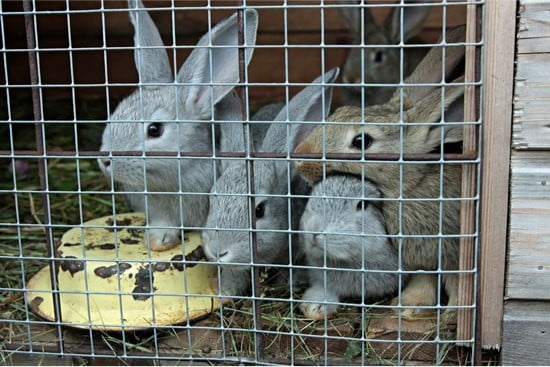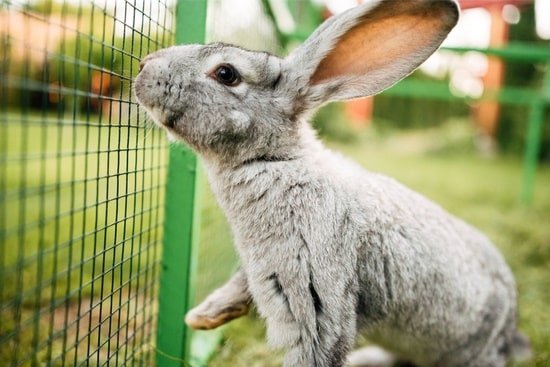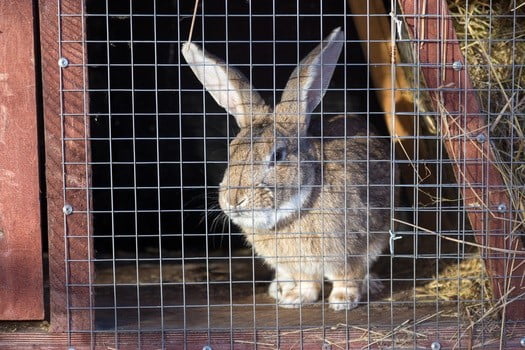A rabbit’s hutch should always make them feel safe and secure when inside it. A hutch is a rabbit’s domain. As they’re territorial animals, rabbits should always be keen to return to their hutch. If this is not the case, something is amiss and must be rectified quickly.
Rabbits are active for several hours after humans go to bed. If the hutch is too small or lacks entertainment, they’ll be reluctant to return. Ensure that your rabbit feels safe from predators. Also, make sure they’ve had enough exercise and human company during the day.
It’s vital to get your rabbit into the habit of sleeping in their hutch. Allowing your rabbit to roam free at night may seem like the path of least resistance, but this opens up many potential dangers.
Can I Just Let My Rabbit Roam Free Overnight?
A rabbit that will not return to their hutch at night can be problematic. Bunnies are often active long after humans retire for the night. This means they need to feel safe and secure.
Leaving a rabbit to run free overnight is a bad idea for the following reasons:
- Rabbits chew everything in sight. Electrical cables are a favorite delicacy. Unsupervised rabbit could electrocute themselves or even start a fire.
- If you have other pets, they will roam the house at nights. Cats, in particular, enjoy the peace and quiet. Your cat may attack your rabbit.
- Rabbits are curious, and gifted escape artists. If there’s a way to leave the house, they’ll find it. Pet bunnies are not equipped to survive in the wild.
It’s always preferable to get your rabbit safe and secure in their hutch at night. If they’re reluctant to return, you need to learn why.
Rabbit is Afraid of Predators
Rabbits are a prey species. Even those born in captivity are aware that countless other animals want to eat them. Understandably, this may leave your rabbit a little skittish at being left alone at night.
Rabbits are not afraid of the dark. Their vision has evolved to see well in dim light. All the same, they do not have night vision as we know it. If it’s pitch black outside, they can’t see their paw in front of their face.
Darkness does not affect a rabbit’s senses of smell and hearing. They can still detect predators outside their hutch. They can’t see them though, which will leave them frightened. They can’t defend themselves against an invisible foe.

A night light is not the ideal solution here. Rabbits need a natural cycle of light and dark to manage their hormones. They may also chew through any wires. Most importantly, the light announces their presence to aspiring predators.
Instead, create a sleeping space for your rabbit that replicates their wild habitat. Wild bunnies sleep in underground burrows, where they’re protected. A cardboard box, turned on its side, is surprisingly effective at replicating this.
This way, your bunny can bury themselves in hay and feel protected. They don’t realize that cardboard is thin. As far as they’re concerned, it’s an impenetrable wall.
Rabbit Has Not Had Enough Exercise
If you have children, you’ll be familiar with protests that they’re not tired at bedtime. Rabbits can be the same. Most bunnies take a long nap during the day, so they’ll be energetic in the evening.
It’s imperative that your rabbit gets enough exercise during the day. Bunnies need to be free range for at least three hours. Some smaller breeds have more energy, and need even more time than this.
Bringing a rabbit into your family is a commitment to meet their needs. That includes sufficient exercise. Ensure your rabbit is given plenty of opportunities to stretch their legs. Failing to do so will leave them feeling frustrated.
Rabbit Wants to Sleep with You
Rabbits are capable of forging complex and emotional bonds with their owners. This dynamic is closer to cats than dogs, as you need to earn a rabbit’s love. Once you’ve done so though, they’ll adore you.
This means that your rabbit will want to spend as much time with you as possible. Bunnies are very social animals. They hate spending too much time alone. They get lonely, stressed, and anxious.
If you don’t spend enough time together, your rabbit won’t want to leave you at bedtime. If you have other pets, the rabbit may have seen them sleeping on your bed. They’ll be wondering what they can’t do the same.
It’s inadvisable to let a rabbit sleep on your bed. The first reason is simple – they’re very small and frail. If you roll over in your sleep, you could easily crush your bunny.
Also, they’ll continuously fidget and nibble your toes or face for attention. They may make your bed as their territory by eliminating. They’ll jump off the bed, potentially hurting themselves if they can’t see.
Take time to play with your rabbit, so they feel sufficiently attended to. Make their bed as comfortable as possible, too. Change the hay regularly, and offer blankets. Your rabbit needs to feel like their hutch is the place to be at night.
Hutch is Too Small
It’s entirely possible that your rabbit’s hutch is too small to meet your pet’s needs. Bunnies are more than capable of feeling claustrophobic. Living in an enclosed space can be horrible for a rabbit.
Remember that your bunny will still be active for a few hours after you go to bed. It’s not as simple as locking them up and waiting for them to fall asleep. They need to feel comfortable in their surroundings.
Check the dimensions of the hutch, especially in comparison to the rabbit. Bunnies grow quickly, and their size can sometimes take pet parents by surprise. The Rabbit House has a failsafe guide to appropriate sizes.
As well as room to jump and play, rabbits need zoning in their hutch. Bunnies have a keen sense of smell. They like to eliminate in one area of their hutch, and sleep in another. If the two areas start to mingle, they’ll be uncomfortable.
Check that the hutch layout meets the needs of your rabbit. If they do not, your pet will be understandably reluctant to return. After all, would you want to live in a home that smell of urine?

Hutch Doesn’t Provide Enough Entertainment
If the size of your rabbit’s hutch is sufficient, that doesn’t mean that your work is done. Even the largest hutch can be explored quickly. This means that life in a cage can grow crushingly dull for your rabbit.
It’s critical that you fill their hutch with toys. Rabbits need constant mental stimulation, especially if they live alone. My Bunny provides insight into how you can keep a rabbit amused.
In addition to providing toys, you should always mix up and change the supply regularly. Rabbits are always on the lookout for new experiences and stimulation. This will keep them happy in their hutch while you sleep.
You don’t need to break the bank at a pet store investing in toys for a rabbit every week. They’ll be happy shredding paper and card, or nudging bunny-safe ornaments. Just ensure they regularly have something new to occupy their mind.
Rabbit Shares Their Hutch with an Unbonded Bunny
One way to provide mental stimulation is to bring home a second bunny. Rabbits are social animals, and love to live with at least one member of their own kind.
Unfortunately, as well as being social, rabbits are territorial. This means that they should only share their living space with friends. Forcing two unbonded rabbits to live together is a recipe for disaster.
They will fight tooth and claw, as both will consider the hutch to be their territory. These fights will have a winner, and the superior pugilist may become a bully. This can leave the other rabbit reluctant to enter the hutch.
The reasons for this will be manifold. The dominant rabbit will demand grooming constantly. They’ll take food from the other rabbit. They will steal the prime sleeping spot. They’ll make life miserable for the other bunny.
If you introduce two rabbits appropriately, allowing them to bond, they’ll be friends for life. They’ll eat, sleep and play together. This means they’ll actively want to share a hutch, and everything else.
Rushing the process, sadly, is a way to destroy a fledgling bunny friendship. The stress of this can also make a rabbit seriously ill. Let the rabbits take their time, and find their rhythm.
Rabbits like to feel safe and secure. A high-quality hutch that meets their needs will provide this. Your rabbit should actively want to return. There’s no place like home, after all.
If this isn’t the case, you need to learn why quickly. Stress can be a silent killer in bunnies, so learn the source of their anxiety. Once you fix the problem, you’ll have a happy and docile pet once more.

